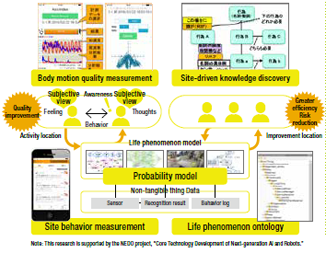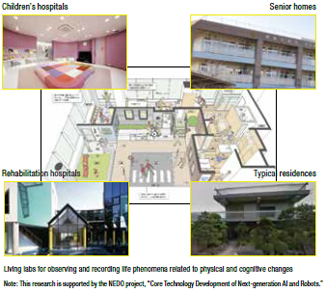
Productivity Service industry
We aim to create new services by supporting manufacturing workplaces.
AI technology for transforming a product-based economy to a service-based innovation
In aiming for a society which creates new high-quality services that exceed existing concepts, it is essential to gather and analyze the experience and knowledge of people in the services industry and to develop a framework for improving and reconstructing operations. Compared to manufacturing workplaces such as factories, service industry workplaces for caregiving, nursing, and education, as well as places that promote health and create community through hobbies such as dance and music, are characterized by their large degree of freedom. For quality control of work in these places, there needs to be a change in knowledge from “tangible thing-centric” to “nontangible service-centric.” Specifically, research is being conducted that gathers non-tangible things such as knowledge and awareness, and connects them to knowledge such as operational procedures and expertise in order to support greater operational efficiency. Research is also being conducted on using previously unobtainable operational big data in prediction and control systems. Using these technologies as a foundation, we are focusing on efforts to reduce labor and power requirements in simulated environments such as convenience stores through the use of AI and robots. In this field, we are also engaged in unique research such as the creation of a framework supported by AI that improves quality in service workplaces creating value through collaboration between people with advanced knowledge and skills. Focus will be placed on how “non-tangible thing-centric” AI technology can contribute to improving quality in the services industry. In addition, there is also a movement to collect sensor data of healthcare and caregiving facilities in living laboratories inside and outside the National Institute of Advanced Industrial Science and Technology (AIST), and to build an open database. We look toward living laboratories serving as places for the development and verification of IoT sensing technology in service workplaces and living spaces.
-
Theme1Improving quality of on-site services and supporting creation of new services
Services with terminology and operational procedures that are heavily situation-dependent and differ from workplace to workplace will be standardized through ontological methods. This will increase compatibility between IoT and various AI apps, and lead to structure of operational knowledge and systematic collection of non-tangible things such as human behavior, meaning, feeling, awareness, and body motion. -

-
Theme2Development of living function resilient service using living labs
Living labs are open innovation environments for developing and evaluating AI that supports our everyday life in the real world. Life phenomenon data are collected from living labs inside and outside of AIST (children’s hospitals, senior homes, typical residences, etc.) We will analyze life phenomenon related to human physical and cognitive changes, and build an open database so that this leads to the creation of new services. -

Future prospects
- Improvement of services through change in perspective from a product-based to a service-based one
- Empowerment of services that use AI and robots
- Accumulation of operational knowledge in wide array of service settings, and support of improvement and reconfiguration

